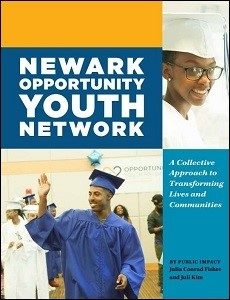New Jersey’s youth face enormous, long-standing challenges, many stemming from historic discrimination and endemic poverty. Nearly 4,000 youth between the ages of 16 and 20 are not in school, and about 3,000 more between 15 and 21 are at risk of leaving school without a high school diploma. Half of the city’s 16- to 19-year-olds, and a third of 20- to 24-year-olds, are unemployed.
Most of these youth have experienced violence or other trauma, or changed schools frequently; an estimated quarter are or have been involved in the juvenile justice system. They tend to be chronically absent from school and over-age for their grade but behind in academic credits. Not seeing a clear path to success, these youth gradually disengage from learning.
But Newark is hardly unique in the U.S. What can make a difference for students there, and how can other communities learn from success in Newark?
In Newark Opportunity Youth Network: A Collective Approach to Transforming Lives and Communities, Public Impact’s Julia Conrad Fisher and Juli Kim describe how the two-year-old Newark Opportunity Youth Network (Newark OYN) brings together key community partners—including disconnected youth themselves, education providers, community-based service providers, and more—to perform four critical tasks:
- Serve as a systems-level backbone organization to provide formal infrastructure to facilitate clear and direct lines of communication among private and public partners, prompting seamless collaboration toward a common vision of college and career success for disconnected youth;
- Deliver direct services to both directly operate and partner with others to operate schools and programs, including a centralized Re-Engagement Center and the state’s first alternative charter school specifically designed to serve disconnected youth;
- Provide technical assistance to community-based organizations and network partners in applying a proven youth development model to their programming; and
- Advocate to influence policy by tapping into its direct work with disconnected youth to illuminate policies that contribute to the challenges they face. With key partners at the table, Newark OYN is positioned to influence these policies and promote improved outcomes for disconnected youth.
“I only needed three classes to graduate. I’m from Newark. I didn’t really have a choice to join a gang, I was born into it. I went to five high schools over three or four years,” said Tyshawn, now 22, one of several Newark OYN youth who reflect in the report on what led them to disengage from school—and how Newark OYN’s educational programs and schools pulled them back, setting them on a path to opportunity. “I had only three classes left for two years that I could never finish. I was in and out of the street, caught up with police and others. I became a parent, too. I didn’t want to be one of those people who wasn’t around to help take care of my son. That’s when I realized that I needed to finish high school, and I was able to do it at UPLIFT because they believed in me and didn’t give up on me.”
The report details how Newark OYN works to meet its mission. Early lessons from its work can help guide other organizations focused on disconnected youth, just as Newark OYN is taking those lessons to heart.

